Global Ethics Forum 2015
Geneva, Switzerland
25-27 June 2015

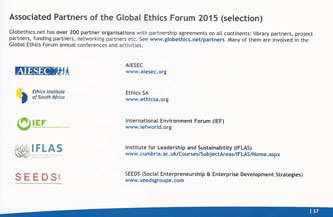 The Global Ethics Forum 2015 was held at the Ecumenical Centre in Geneva,
Switzerland, on 25-27 June. The 150 participants came from all over the
world to discuss "Responsible Leadership in Action: The Value of Values".
In addition to plenaries and panels, there were 12 workgroups that met
three times to discuss tools and prepare projects to implement them. The
International Environment Forum has been an Associated Partner to Globethics.net
and the Global Ethics Forum for several years, and it was one of five such
partners (out of 200) to have its logo featured in the conference
brochure. ebbf - Ethical Business Building the Future is also an
associated partner. IEF was represented this year by Arthur Dahl and
Joachim Monkelbaan, and ebbf by Nauman Hussain and Caroline Zagrecki
Sawicki.
The Global Ethics Forum 2015 was held at the Ecumenical Centre in Geneva,
Switzerland, on 25-27 June. The 150 participants came from all over the
world to discuss "Responsible Leadership in Action: The Value of Values".
In addition to plenaries and panels, there were 12 workgroups that met
three times to discuss tools and prepare projects to implement them. The
International Environment Forum has been an Associated Partner to Globethics.net
and the Global Ethics Forum for several years, and it was one of five such
partners (out of 200) to have its logo featured in the conference
brochure. ebbf - Ethical Business Building the Future is also an
associated partner. IEF was represented this year by Arthur Dahl and
Joachim Monkelbaan, and ebbf by Nauman Hussain and Caroline Zagrecki
Sawicki.
The Forum was organized by Prof. Christoph Stückelburger, Director and
Founder of Globethics.net, and opened by Ambassador Walter Fust, President
of Globethics.net.
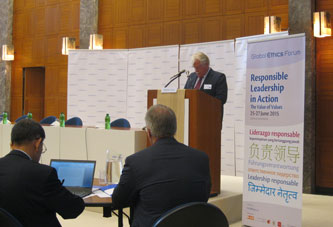 .
. 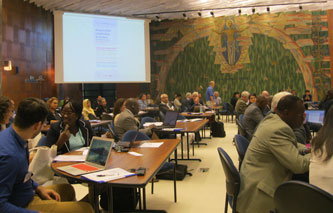 .
. 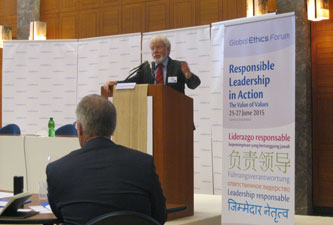
Ambassador Walter Fust opening the forum; part of the audience;
Prof. Christoph Stückelburger
In the opening keynote by Musimbi Kanyoro of Kenya, President/CEO of the
Global Fund for Women, she asked what was responsible leadership? It is
learning how to lead together with others, with a common perspective,
sharing ideas, the journey and the credit. You change yourself to align
with others, finding a course together. Such a leader is balanced by
values, grounded in mission, inspired by vision and pragmatic in practice.
Failing is part of good practice, trying things to learn from them,
encouraging more honesty and forgiveness. Finally, a responsible leader
knows when to go, when it is time for a change.
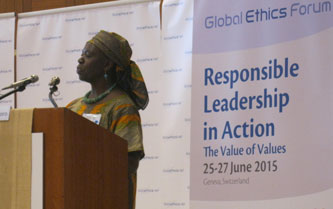 .
. 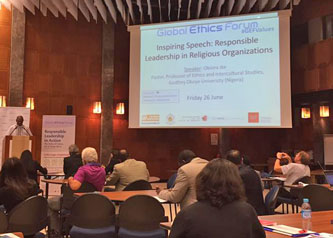 .
. 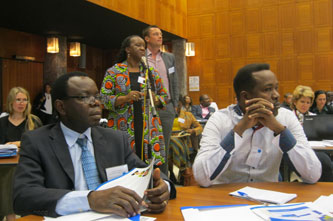
Musimbi Kanyoro giving her keynote; part of the audience with
Arthur Dahl on right; Joachim Monkelbaan (back centre) waiting to ask a
question
The opening panel on State of and Need for Responsible Leadership, was
moderated by Deon Rossouw of the Ethics Institute of South Africa.
Alexander Ageev, Director of the Institute for Economic Strategies in
Moscow, listed the challenges or revolutions that were coming: the end of
the world, the genetic revolution, the manipulation of brain functioning,
mass migration, the economic cult of GDP versus the spiritual emancipation
of measures of happiness and well-being, crises in the financial system,
transparency in all things and a revolution against transparency, new
technologies with military uses, and many other competing issues calling
for creativity, empathy and integrity. Jem Bendell of the Institute for
Leadership and Sustainability (UK) talked about enabling everyone to lead
together through mutual responsibility, group literacy and shared values.
Liu Debing of the Center for International Business Ethics, China,
described classical Chinese leadership as starting with individual
cultivation, nurturing sincerity, seeking perfection, and learning
happiness in the home before harmonizing the nation and pacifying the
world. Responsible leadership required integrity, responsibility, passion,
a win-win spirit and willingness to learn. Florencia Luna of the Bioethics
Program, FLASCO, Argentina, described the risks from contagious diseases
in an interconnected world, and the need to protect the most vulnerable.
The discussion that followed raised the issues of interconnectedness and
human rights, the responsibility of leadership for the ecological crisis,
and the need to practice systems thinking.
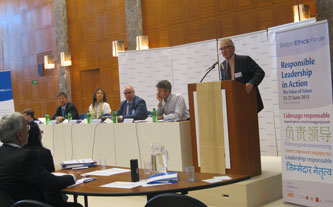 .
. 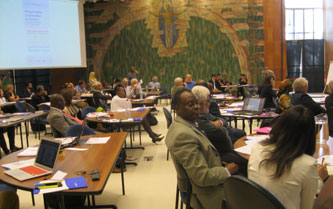 .
. 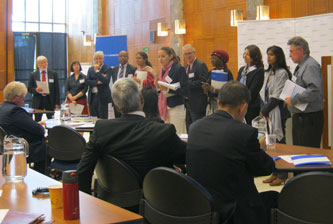
Opening panel session; part of the audience; introduction of
workgroup leaders
The working groups discussed implementing general codes and standards,
such as an institutional code of ethics, reducing inequalities by
providing equal access to education and jobs, and implementing integrated
reporting; as well as innovating leadership through women, investment and
the media. A second set of themes included improving values-driven
leadership in business, higher education, politics and religion.
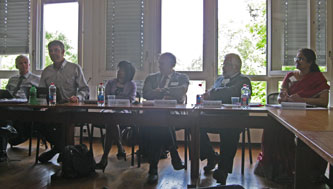 .
. 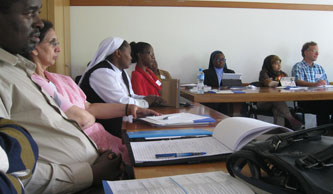 .
. 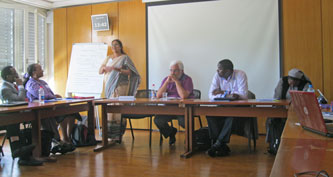
workgroup sessions
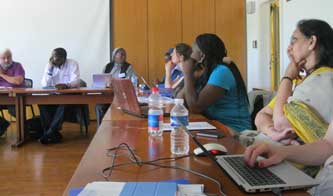 .
. 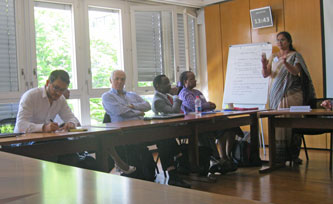 .
. 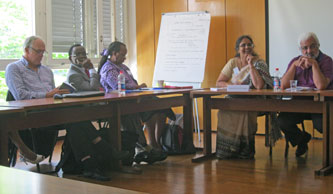
workgroup sessions
The first day concluded with a public event at The Graduate Institute
featuring a panel on Developing Systems and Strengthening People for
Responsible Leadership, musical entertainment by artists from the
Globethics network, and an address by the Mayor of Geneva, Madame Esther
Alder.
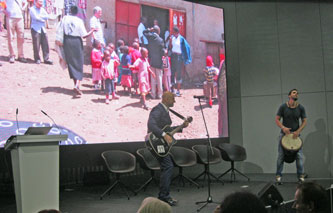 .
. 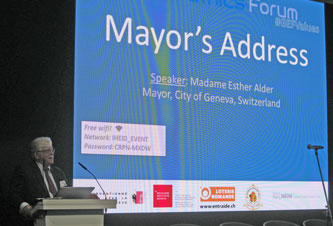 .
. 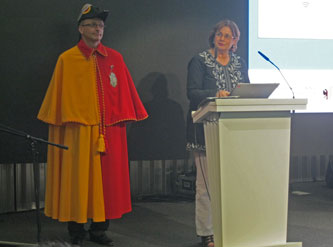
Musical performance at the public event; Ambassador Fust
introducing the Mayor; Mayor Esther Alder presenting her address
On the panel, Kamel Ayadi of the Global Infrastructure Anti-corruption
Centre in Tunisia talked about responsible leadership in business and the
need for tools and standards such as ISO 26000, the Global Reporting
Initiative and Global Compact, and a new ISO 37001 antibribery standard,
and the difficulty of distinguishing sincere efforts from simple
communications, requiring the commitment of top management. Liu Debing of
China described how continued learning was necessary with globalization
and rapid change. Divya Singh, Vice Principal, University of South Africa,
called for values-based leadership in universities. Training ethical
global citizens required more holistic approaches beyond the siloed
academic disciplines with real community engagement. Universities needed
to be socially responsible, and to assess their impact in the community.
Cedric Dupont of The Graduate Institute said responsible leadership
combined vision and imagination to provide solutions, with creative
destruction of the status quo. Contributing to the global interest
required values inclusive of diversity, thinking globally, holistically
and independently, and embracing change. It was necessary to break
preconceived ideas and established world-views, to use foresight tools to
think about the future, and be comfortable in a zone of discomfort, with
the ability to listen, communicate and tell stories. In the discussion,
Caroline Zawicki of ebbf described the experience of Nur University in
Bolivia requiring 120 hours of service to the community and thus creating
an awareness of social realities.
The second day opened with inspiring speeches by Obiora Ike, Pastor and
Professor of Ethics and intercultural Studies in Nigeria, described the
emergence of transparent processes for religious leaders in Africa.
Vasanthi Srinivasan of the Indian Institute of Management in Bangalore
referred to ethics in politics and public administration and the challenge
of fighting corruption at all levels. Paulachan Kochappilly, Professor of
Moral Theology in India, talked about celebrating transformation and
change, with enlightenment inside to truth, goodness and beauty leading to
a desire for service in responding to the needs of the deprived. Naupess
Kibiswa of the African Centre for Peace, Democracy and Human Rights in DR
Congo said there was no civil society under dictatorship in his country,
but a recent rise in civil society organizations as an intermediary
between the people and the state, filling gaps in state services and where
people were abandoned to militias. Tayfun Zaman of the Turkish Ethics and
Reputation Society referred to the need for trust in business. Most of a
multinational's value was in its reputation. A business leader must
inspire values in the company as a hard-core asset for employees,
customers and the whole world.
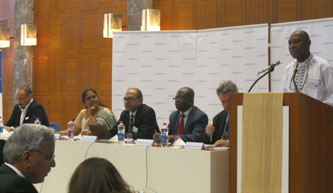 .
. 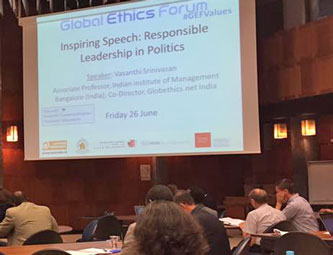 .
. 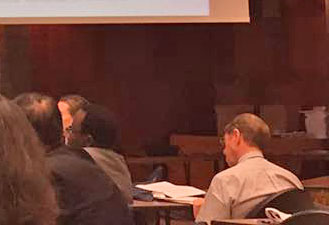
Inspiring speakers; part of the audience, including IEF
representatives Arthur Dahl and Joachim Monkelbaan on right; Dahl taking
notes
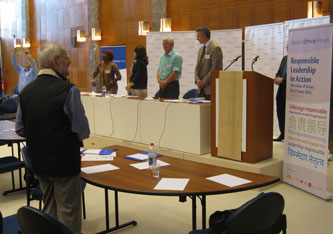 .
. 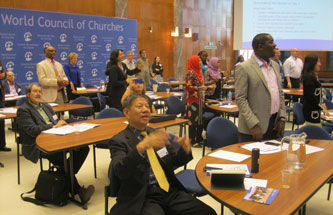
Workgroup leaders report back to an enthusiastic audience
The workgroups continued their work and reported their outcomes in the
closing session. There were also announcements of the Code of Ethics
collection in the Globethics.net Online Ethics Library, and the new
Globethics Academy online courses. The annual Global Ethics Forums and
their sponsoring organization Globethics.net
demonstrate the world-wide interest in ethics as a foundation for efforts
to create a better world.

 The Global Ethics Forum 2015 was held at the Ecumenical Centre in Geneva,
Switzerland, on 25-27 June. The 150 participants came from all over the
world to discuss "Responsible Leadership in Action: The Value of Values".
In addition to plenaries and panels, there were 12 workgroups that met
three times to discuss tools and prepare projects to implement them. The
International Environment Forum has been an Associated Partner to Globethics.net
and the Global Ethics Forum for several years, and it was one of five such
partners (out of 200) to have its logo featured in the conference
brochure. ebbf - Ethical Business Building the Future is also an
associated partner. IEF was represented this year by Arthur Dahl and
Joachim Monkelbaan, and ebbf by Nauman Hussain and Caroline Zagrecki
Sawicki.
The Global Ethics Forum 2015 was held at the Ecumenical Centre in Geneva,
Switzerland, on 25-27 June. The 150 participants came from all over the
world to discuss "Responsible Leadership in Action: The Value of Values".
In addition to plenaries and panels, there were 12 workgroups that met
three times to discuss tools and prepare projects to implement them. The
International Environment Forum has been an Associated Partner to Globethics.net
and the Global Ethics Forum for several years, and it was one of five such
partners (out of 200) to have its logo featured in the conference
brochure. ebbf - Ethical Business Building the Future is also an
associated partner. IEF was represented this year by Arthur Dahl and
Joachim Monkelbaan, and ebbf by Nauman Hussain and Caroline Zagrecki
Sawicki. .
.  .
. 
 .
.  .
. 
 .
.  .
. 
 .
.  .
. 
 .
.  .
. 
 .
.  .
. 
 .
.  .
. 
 .
. 